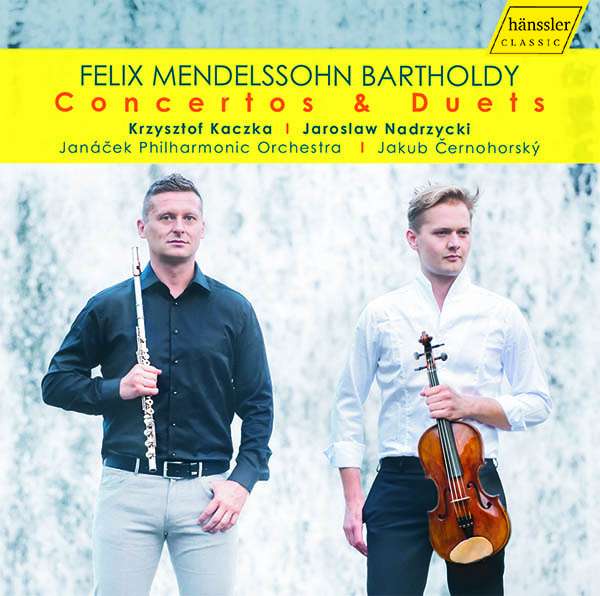Ein offenes und transparentes Klangbild stellt sich hier ganz in den Dienst von kammermusikalischem Feinschliff. Und davon profitieren nicht nur die beiden exzellenten Solisten Jaroslaw Nadrzycki, Violine, und Krzysztof Kaczka, Flöte, sondern auch die Musik von Felix Mendelsohn Bartholdy.
Zu hören gibt es Raritäten, nämlich das Konzert für Violine und Streicher des 13-jährigen Mendelssohn, das bekannte Violinkonzert in der Bearbeitung für Flöte und Streichorchester und vier Auszüge aus Lieder ohne Worte, hier also für Violine und Flöte. Die beiden Konzerte werden von Jakub Cernohorsky leicht und wendig dirigiert, der Violinist wie auch der Flötist bekommen genug Raum, um ihr Spiel zu entwickeln, ohne je dabei forcieren zu müssen. Das Orchester ist tadellos. Beide Konzerte wirken insgesamt sehr frisch und Liebhaber des op. 64 werden sicherlich Gefallen an dieser farbigen und geradlinigen Interpretation und Transkription finden. Interpretatorisch bleibt man klassisch. Und das ist auch gut so. Das kammermusikalische Konzept lässt die beiden Konzerte wirklich frei atmen und tut durch diese Transparenz besonders dem bekannten Violinkonzert in der Fassung für Flöte sehr gut. Bei den vier Liedern ohne Worte harmonieren Nadrzycki und Kaczka auch bestens als Duo.
In this recording, an open and transparent sound is entirely in the service of finely polished chamber music. And not only the two excellent soloists, violinist Jaroslaw Nadrzycki and flutist Krzysztof Kaczka benefit from this, but also Mendelsohn’s music.
There are rarities to be heard, namely the Concerto for Violin and Strings by the 13-year-old Mendelssohn, the well-known Violin Concerto in the arrangement for flute and string orchestra, and four excerpts from Songs without Words, in this case for violin and flute. The two concertos are conducted lightly and nimbly by Jakub Cernohorsky, and both the violinist and the flutist are given enough space to develop their playing without ever having to force it. The orchestra is impeccable.
Both concertos look very fresh overall, and lovers of Op. 64 will certainly enjoy this colorful and straightforward interpretation and transcription. The performances are in a classical style, which is positive. The chamber music concept really allows the two concertos to breathe freely, and this transparency does the well-known violin concerto in the flute version a lot of good. In the Four Songs without Words, Nadrzycki and Kaczka also harmonize perfectly as a duo.


















